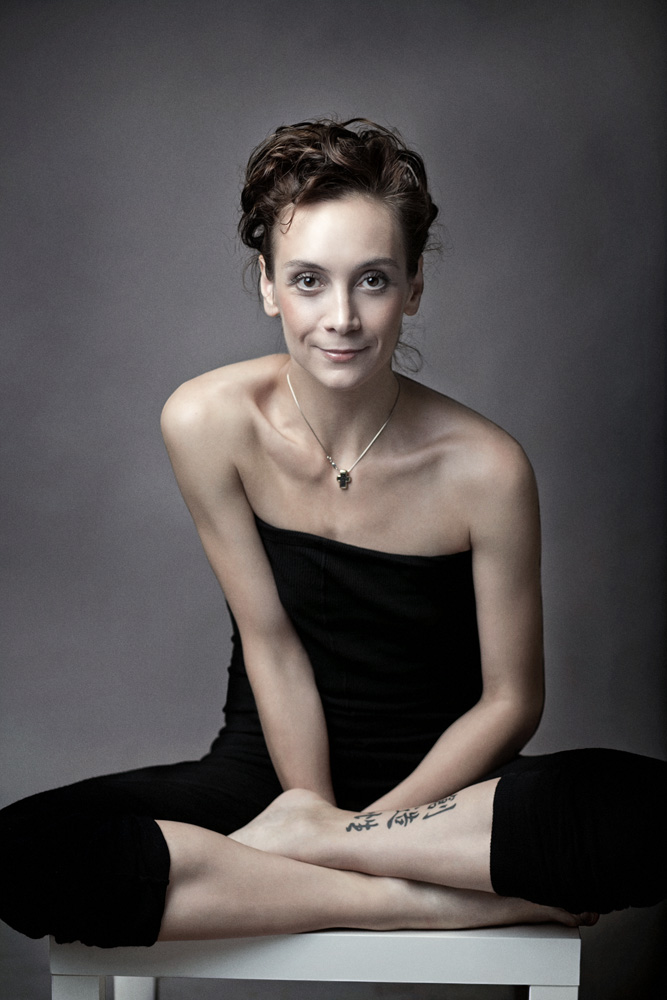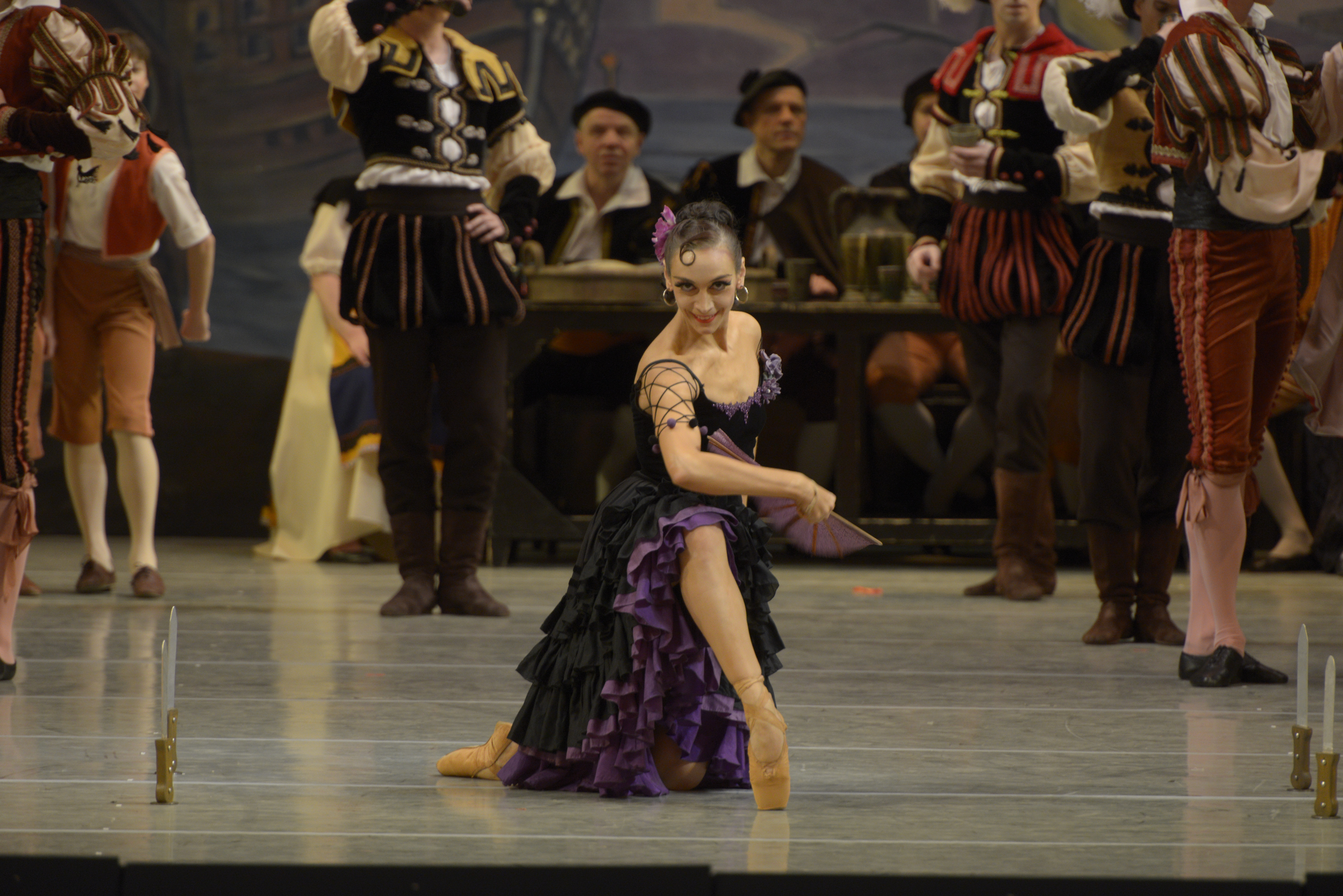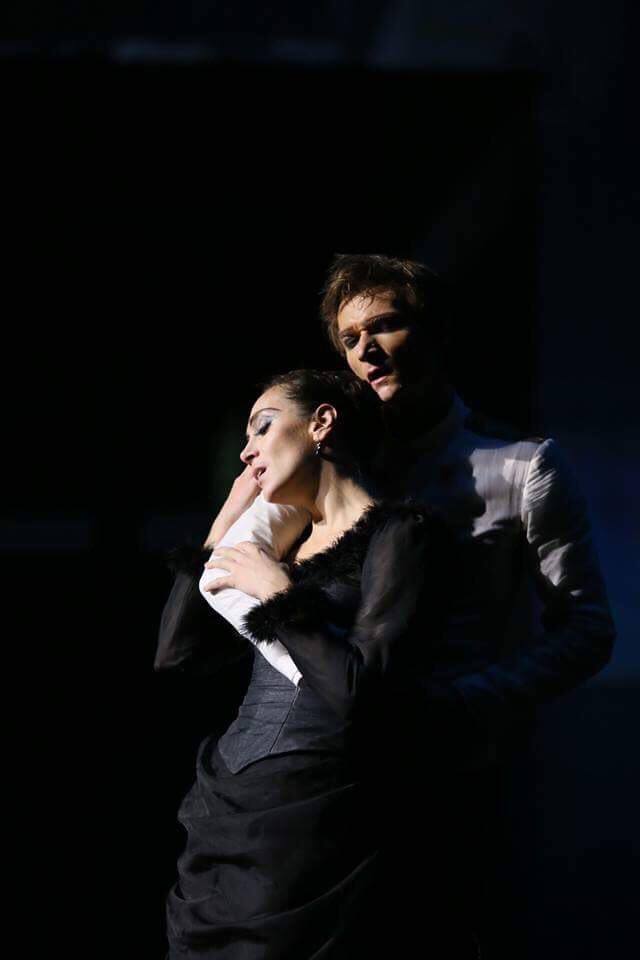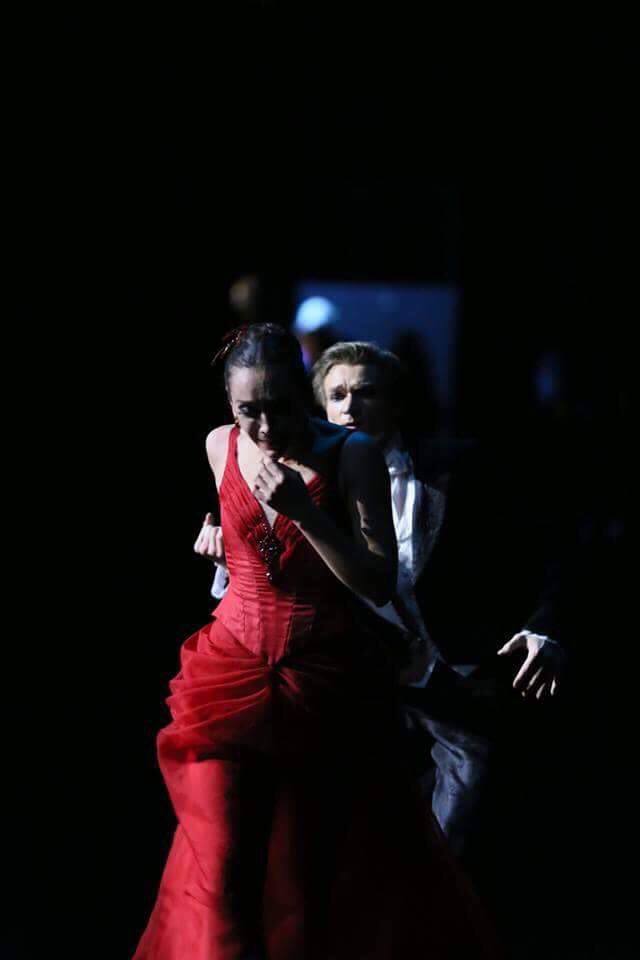Mariinsky Ballet Prima Ballerina Daria Pavlenko made a difficult decision three years ago. She chose to retire officially from the Mariinsky Ballet troupe although she had the right to remain longer. While other primas have remained on roster for five, ten, or more years after the accepted retirement age of 38, performing rarely or not at all yet still receiving pay, Pavlenko decided to move on to other pursuits. She performed Alexei Ratmansky’s “Anna Karenina” for her final performance in July 2018 and immediately enrolled in the Rimsky Korsakov Conservatory to study pedagogy. With her plate full of various endeavors now, she continues to develop her stage career in a new direction, while tending to her family full time as well.
Untainted by the elitism that plagues many international stars, Daria Pavlenko’s honest approach to her art form emerges just as easily in conversation as it does in all of her onstage roles. VaganovaToday sat down with her to find out about her life as a dancer, teacher, mother and wife.
Your story in ballet is not very typical. You were born in Moscow, and lost both parents at an early age. Did your parents put you in ballet class or was it your choice?
My mother really loved ballet, and it all began with my sister Nadezhda. She’s 7 years older me, and I wanted to be like her. By the time I was 3 years old, she had already joined the Vaganova Academy. My first memories at a conscious age entailed the thought that I would be like Nadia, and for me ballet was my life direction. Plus we had many books about ballet at home, my mom really loved it. So from very young age I intentionally moved in the direction of becoming a ballerina.
The story goes that you were refused from MXAT (the Moscow Choreographic School) for a trivial reason?
They said that I did not have a “stage appearance.” I think it was an excuse because that was a time when the Moscow school was popular and prestigious for children in the capital. And so since we didn’t have any “connections”, they didn’t accept me. But I didn’t understand anything at that age, so I was fine with it and I was sure they would take me in Leningrad. When I was accepted in Leningrad at the Vaganova Academy, it was my sister’s last year of study. So although I was of course without my mom and my dad, my sister was there so I was not completely alone. The next years were difficult, but for me it was a plus, it proved useful for me later.
What were your first impressions of the Academy dormitories and atmosphere?
It was a very friendly atmosphere. When I think back to my dormitory life, those were very good years. They taught me a lot, and I think if I had lived at home, I would have been a totally different person. We had a great deal of fun. It was “early life training” for me but I don’t regret anything. We were mischievous there too, and if my daughter did now what I did then, I would be horror stricken! (laughs) I have wonderful memories of the dormitory and of studying.
When did your love for your profession appear?
I can’t say that love appeared per se, but a sense of responsibility and desire to achieve success around age 13 or 14. At that time, my sister came to watch my exams (it was the 3rd year for me) and she said I had the capabilities to be a ballerina with a capital “B”, but to rely only on those capabilities won’t be enough. I remember having this serious conversation that incited me to look at my profession again. I wanted to achieve success. But love for my profession, I would think with each year it changes, and it’s more a love/hate relationship. Ballet is a difficult profession, not just physically, but emotionally and psychologically. Each time you go on stage it’s not enough just to remember and perform the technical elements. Now that I’m a pedagogue and ballerina at the same time, I look at it a bit differently as well.
Anyway, when I was about 13, I just carried out the steps. I wasn’t putting myself into it and I didn’t quite catch the pedagogue’s words. It was not difficult to me, I didn’t stay in the studio “until the 7th sweat” as they say. My sister said, “You have to work and put effort into it, there must be a desire to reach a new level, otherwise there is no meaning in it.”
Did you aspire to join the Mariinsky?
I was open to any companies. But just before graduation I got a gastroduodenal ulcer because we were eating very poorly, and I ended up in the hospital. They discharged me after 3 weeks there, but I was very fat because they fed me well there. At that point, I was only thinking about how to pass the exam well, I wasn’t sure that the Mariinsky would take me at all. And when they told me that the Mariinsky had accepted me, I was surprised more than anything else. I had been told I would be in the corps de ballet. Excellent.
What was the first year in the theatre like?
It’s hard to say. I can’t say the atmosphere was friendly in the sense of people waiting with open arms to hug you and say welcome. No, that wasn’t the case. You came and had to prove that you could do something and that you understood what was going on, regardless of if you wanted to dance solos or if you were just in the corps. It was difficult but it was life experience, without which you do not grow. It’s very important how you take this in. You can either look at it with a plus or with a minus. So yes… of course it was difficult, of course there were times when you just felt as if your legs were collapsing beneath you, and you lose faith in yourself, but without it, nothing would have developed. The process creates character and makes you a ballerina. And you don’t just swallow it, on the contrary, you either grow and achieve a result or else you give up.
When were you made soloist?
I spent four years in the corps de ballet, and in the 4th year Alexei Ratmansky came to set Poème d’Ecstase, Fairy’s Kiss and Middle Duet. I was also placed in the second cast of Poem after Svetlana Zakarova but that was in my second season. It was standard situation, where a list of dancers are put in a new production and then those dancers do not come to rehearsals because they’re busy with the current repertoire and as a result no one comes. For Middle Duet, no one came, so Alexei asked me to come learn it. I remember in the first rehearsal, it is only a10-minute duet, I had no partner, so I used the barre and I learned it very quickly. Alexei saw that not only could I do it, but I danced it not too badly. Then they found me a partner, Slava Samodurov, who also wanted to dance it. So Zhanna Ayupova and Islom Baimuradov danced the first night, and we danced the second. And no one expected it would be that good. That is when my career truly started and Makhar Vasiev [ed: artistic director of the Mariinsky Ballet at the time], understood and believed that I could be more than just a corps de ballet member.
Did the atmosphere at the Mariinsky change during your tenure there and if so, in what way?
All of life changed, and above all I changed. It’s an interesting thing– you become a prima and have a certain level of status and skill, and you think you did it, that’s it. . But that’s a big mistake, because as once you stop, you fall behind. You always have to climb up the ladder. It’s important that I changed. I always had normal relationships with my colleagues and with pedagogues though, never any conflicts.
You decided to officially retire, which is a unique decision given that other primas at the Mariinsky have stayed on the roster long after they actually stopped dancing. What prompted your decision?
First of all, I thought and still think it’s dishonest to hold a position if I’m not carrying out the specific work of a prima ballerina that is given to me. I understood that my existence in the Mariinsky Theatre was becoming meaningless, the repertoire that I danced did not expand, and there was not a lot of new work in those last years. There were many circumstances that led to the decision, including the fact that their repertoire did not change, did not expand, and I would say still is not expanding. I wanted to continue to grow, to seek out other avenues of dance. But the Mariinsky Theatre limited my freedom. Even when there were opportunities I received, I could not accept them because I had my work at the theatre that wasn’t interesting to me. So I left the Mariinsky Theatre, but I didn’t leave the profession, I still dance as a ballerina. I left because it limited my freedom and did not give me the level of accomplishment that I wanted.
You’re still performing in classical ballets. In April, you have a premiere with the Astrakhan Ballet, tell us about it.
I will dance a ballet called “Paris” based on the relationship between Georges Sand and Frederic Chopin set by Dmitry Gudanov, who is currently the artistic director in Astrakhan, he was a former premiere danseur at the Bolshoi. I first visited there in December with my partner Denis Klimuk for a gala dedicated to the period of Soviet ballet. We danced the adagio from Leonid Jakobson’s Spartacus, and the adagio from Legend of Love. Despite Gudanov and me being almost the same age, we never crossed paths before, never participated in joint projects. He saw me and said, “I need you.” We have become good friends. It’s nice to find another professional who shares your values. For me it’s a gift because when I am needed as a dancer, that is always my priority.
I also received the rights to Roland Petit’s “Death of a Rose” in November 2020. I wrote the artistic director of the Roland Petit Trust, Luigi Bonino, and asked permission to dance that ballet. He didn’t know who I was, so he said to send him a video of me rehearsing it. I have to thank my partner Denis Klimuk, principal dancer with the Leonid Jakobson Theatre, for working on it with me. It was quite an adventure, as they could have said “you know, no, you can’t dance it.” But after Luigi watched the video, he said that he had goosebumps, and loved how we danced it. He had some corrections to give us, and at first he implied we had to come to Milan or he to St Petersburg, but then Covid started, so we hired Elena Shubina who knows Italian well, to work with us online so that we would not lose time in English trying to understand each other. Elena gave us immeasurable help. After rehearsals, Luigi granted us a licence to dance the ballet for 2 years. We are the only people in the world who have this right for these two years. We performed it in Moscow in December 2020 and really hope that we can dance it again soon as soon as Covid clears out a bit more.
You have already set Fountain of Bakchisarei in Hungary. Are you going to set more works?
I do not have any plans to continue this. It was a gift life gave me. I set “Fountain” in both Budapest and in Samara. In mid-March I’ll return to Samara to correct it, because received several nominations for the Golden Mask awards (for Best Production, Best Female Role, Best Male role, best secondary supporting Male Role, Best Costumes, etc.). The team included Tanya Noginova, the costume and wardrobe mistress extraordinaire, sets restored by Andrey Andreyevich Voitenko, and Sasha Naumova who was the lighting designer, he gave the production light — all of these people were all part of our Petersburg team. Without excess humility, I will admit that the production turned out to be very high quality thanks to the team and artists who breathed life into it, because truly without it there is no point in doing a production. So, sure, if someone asks me to set a new ballet, I will do it, but I am not a choreographer, I will not choreograph. Life gave me the gift of that chance, as they say, so I used it.
You are also studying at the Conservatory now as a rehearsal coach and balletmaster. But do you really need that diploma?
I began attending the Conservatory because I left the theatre in summer, thought I would have free time, and I submitted my documents to study that fall. I didn’t just want to obtain a diploma, it was the process that interested me and I still find it very fascinating. The secondary subjects there are very interesting and important to me, because I am developing through them. I mean, not ballet, but subjects such as History of Art, History of Painting, History of Russian Literature, History of Music Abroad, Russian Music, Psychology — I am discovering all of these things now, and I enjoy it immensely.
You had your debut with the Pina Bausch troupe in 2020, which is another unique step after a career as a classical ballerina. How did that come about?
This was a completely different avenue for me, but this also turned out to be a success. I received a call from the Committee of Culture in Russia, which each year presents Russian culture in various countries. When they called me, they were supposed to go to Dussseldorf, where was a ballet school. They asked me to give 2 master classes there, and I agreed. And I remembered that the school was 15 minutes away from Pina Bausch’s company by train. I asked a ballet critic to contact her friend, Oleg Stepanov –he worked in a provincial company in Ekaterinburg and participated in the Bolshoi’s production of “Rite of Spring” before joining the Bausch troupe– to ask them if I could come and just audition, because I will be in Dusseldorf anyway, what if I suit them? They said yes, sure come. But they were hesitant about it because they had never hired a ballerina with a classical background of the level I have. Pina loved classical ballet and all the members of the company have a classical base, but they’ve never had a prima ballerina come. So I went and rehearsed for two days with Helena Pikon, a dancer, and they said, “OK we will be in touch.” It was springtime, and that summer (2018), I received an offer to join them as a guest dancer. The company doesn’t have soloists. So I flew there, rehearsed two productions, stayed and performed them. They were “Blubeard”, which had not been danced for the past 25 years, and “Seven Deadly Sins.” We plan to continue working together, but right now it is all on hold due to Covid.
What were your impressions of the company?
I really liked the atmosphere in the troupe and the dancers in the company in terms of their freedom and honesty, not just as human beings but on stage, how they work. For me it’s a very inspiring experience. Of course I worried about how they would accept me as a former prima classical ballerina into the troupe. I knew they would relate to me with a bit of hesitation at first, but now we chat on social media and they all say “Daria, Daria when are you coming back, we miss you” etc. They are very open. It was a wonderful experience.
How do you feel about social media? Does it help ballet as an art form?
I’m not a fan. For me, from the point of view of art, I mean, ballet, and what I do, I don’t like it. I suppose you can use it to advertise yourself: what you are you doing, what your plans are, what’s going on in your life. But it takes a huge amount of time out of my life now, today, if I do that. I discussed this with my daughter, how there is a duality: a person who lives in reality and then the very same person who lives in the unreal world of Instagram and sometimes it turns out that the “person” on Instagram lives more than the person in reality. I categorically do not like that. My husband did all of my Instagram posts and there are maybe 3 or 4 there (laughs). I can’t do it, it’s just not interesting for me, and if something isn’t interesting, then nothing will make me do it. In order to do something, I have to enjoy it. Like with obtaining the rights to “Death of a Rose” — I did it because I wanted to, it inspired me. So for me, social media is only to announce what you’re doing, and to connect with people. Of course you should be reachable. But it shouldn’t be overvalued, we need to stay in the real world.
You and your husband cooked for the audience on Instagram and the “show” was popular. Do you plan to do more?
No plans to do a regular program, we did it just because the quarantine was strict and because I cook regularly, regardless. And Sasha said why don’t we film it, since you’re going to do it anyway. I enjoy it, it’s creative. I very rarely cook to a recipe point by point, I always improvise and alter something, although some things you cannot change., such as dough. But fillings you can change. Fr example a recipe is with cherries but you do it with blackberries. Or it is a chocolate pie and I do a different kind. So it was it a spontaneous idea, just so that people cooked with me because I do it anyway.
You have two daughters. Have they altered your approach to your career?
I don’t think they changed my view of my profession. Despite the fact that I love my profession and it’s a large part of my life, no matter what happens, my priority is always my family. My daughters are what will remain after me. And I say this after arguments between my children: that they should be friends, I try to facilitate friendship between them. Because when I am no longer here, they will only have each other. There’s nothing better than sisters who are close. I want them to be friends, share grief and joy together, and support each other.
I understand your younger daughter, Miroslava, may study ballet later?
It’s her decision. Yaroslava [ed: the older daughter] draws fantastically, you don’t have to insist she does it, she spends lots of time on it. She has shown me some of her work and I can’t even do something close to it. I want her to develop that talent and go in that direction. But Miroslava, my younger daughter, moves constantly, she cannot sit in one place, she constantly jumps and climbs. So the “movement story” is hers. Whether it will be ballet or not, we will see, but she will have to have some sort of physical outlet.
How do you manage to juggle work/study and family?
I admit, I don’t know! I just try to manage to do everything. Probably I don’t manage everything but you know…I know a woman who manages to do so many things that she doesn’t do any one thing with quality. When I know I can’t do something in a quality manner, then I try not to do it. I’ll do something only if I don’t have to sacrifice something else in the process. I receive offers for various projects but I know that sometimes, if I do X, it will be at the expense of my children seeing me, so I will refuse that type of work. Or for example I have basic daily work at the Jakobson Theatre as pedagogue/rehearsal coach now, and Andrian Fadeev, the artistic director, knows ahead of time if I have other engagements. I try not to take on additional projects if it will hurt my work at Jakobson. Any kind of work that I do is my CV, my resume, it is my “face”, and I don’t want to be embarrassed about it. So if I can’t provide a quality job, then I won’t do it.
Your husband caught Covid while working at the Mariinsky. Did you catch it too?
No, I didn’t. Sasha and our eldest daughter got it, but the younger daughter and I, we didn’t get it. We didn’t change anything at home – we were in the same rooms, breathing the same air, no masks at home.
How did you handle the lockdown?
We were all together finally, as a family. We stayed in the city and took walks outside together every day because I was against sitting at home. I don’t understand how you can sit at home for months on end. For me it was a positive time, as I was home with my husband and daughters. Sasha and I did intensive workouts daily at home, because doing a ballet barre at home using furniture would have been stupid and brought no results. We used weights sometimes, and sometimes just did cardio. It all turned out great.
Would you say there is “life” after the stage? Are you happy?
By nature, I’m a happy and lucky person. I’m grateful that life has given me so many opportunities and chances, I just try not to miss them. I’m very glad I left the Mariinsky, because I believe I did it on time. By that I mean, it wasn’t a case of everyone whispering “Ten years ago she danced well, but now we have to just put up with seeing her.” I avoided that. I left when I could still dance, maybe for another year or two, and I’m not embarrassed about what I did. I could probably have done more but I didn’t, not because I didn’t want to, but because it just worked out that way.
–March 11, 2021.–






